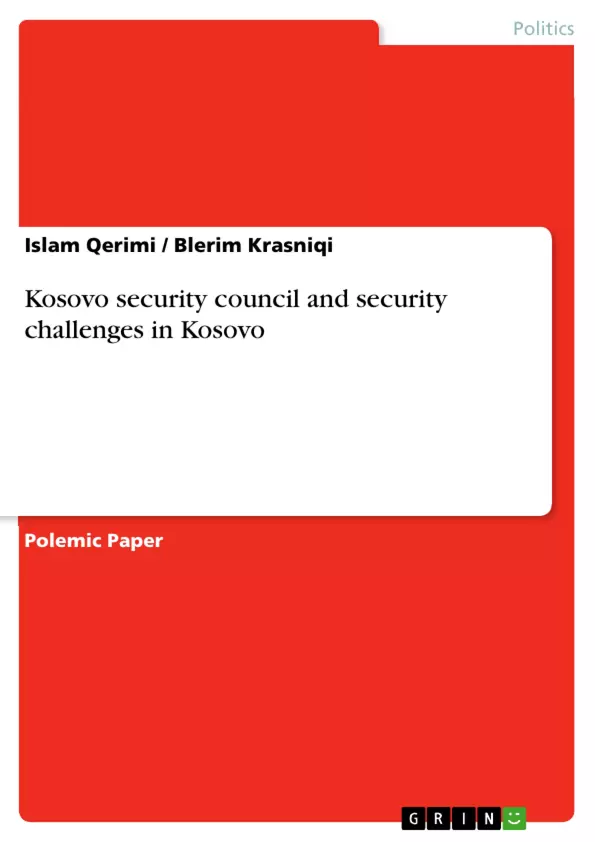Security Council of Kosovo in particular, should work closely with Ministries, Agencies, Police, institutions and citizens who can as well contribute with their feedbacks on developing a security strategy that should serve to other relevant institutions as a reference of their strategies.
The level of security in the country should be reviewed continuously from the Security Council of Kosovo and adjust to the current circumstances and situation, and should be compiled in coordination with all relevant public institutions and civil society.
Inhaltsverzeichnis (Table of Contents)
- ABSTRACT.
- INTRODUCTION..
- NAMING THE SECURITY COUNCIL OF KOSOVO
- THE LEGAL BASIS FOR THE ESTABLISHMENT OF THE KOSOVO SECURITY COUNCIL.
- ROLE AND FUNCTION OF KOSOVO SECURITY COUNCIL
- DRAFTING OF SECURITY STRATEGY IN KOSOVO.
- CLASSIFICATION OF INFORMATION AND KSC ASSESSMENTS ON THE SECURITY SITUATION IN THE REPUBLIC OF KOSOVO
- RECOMMENDATIONS AND CONCLUSION.
Zielsetzung und Themenschwerpunkte (Objectives and Key Themes)
This report analyzes the Kosovo Security Council (KSC) and its role in addressing security challenges in Kosovo. It examines the legal basis for the council's establishment, its functions, and its contribution to developing and implementing security strategies. The report also investigates how the KSC assesses and classifies security threats facing the Republic of Kosovo.
- Establishment and legal basis of the Kosovo Security Council
- Role and functions of the KSC in security planning and forecasting
- Security challenges facing Kosovo, including terrorism, human trafficking, and organized crime
- KSC's role in drafting and implementing security strategies
- KSC's assessments and classification of information related to the security situation in Kosovo
Zusammenfassung der Kapitel (Chapter Summaries)
- ABSTRACT: The abstract highlights the importance of national security, encompassing both physical security and socio-economic development. It emphasizes the need for cooperation between institutions and citizens to address contemporary security threats, including terrorism, organized crime, and corruption.
- INTRODUCTION: This chapter provides a historical overview of security challenges, tracing them from the Cold War era to the contemporary context. It highlights the importance of state sovereignty and security in light of global instability and points to Kosovo's unique security challenges following the 1999 NATO intervention.
- NAMING THE SECURITY COUNCIL OF KOSOVO: This chapter discusses the establishment of the Kosovo Security Council (KSC) as a mechanism for security planning and forecasting in the wake of Kosovo's independence declaration in 2008.
- THE LEGAL BASIS FOR THE ESTABLISHMENT OF THE KOSOVO SECURITY COUNCIL: This chapter delves into the legal framework underpinning the KSC's establishment. It explores how the KSC was established through the adoption of legislation and its role in upholding the rule of law and promoting security.
- ROLE AND FUNCTION OF KOSOVO SECURITY COUNCIL: This chapter examines the KSC's role and functions, focusing on its responsibilities in security planning, coordinating with other institutions, and developing security strategies.
- DRAFTING OF SECURITY STRATEGY IN KOSOVO: This chapter explores the KSC's contribution to developing security strategies. It examines the council's methods for assessing and addressing security threats, including the collection and analysis of information related to various threats.
- CLASSIFICATION OF INFORMATION AND KSC ASSESSMENTS ON THE SECURITY SITUATION IN THE REPUBLIC OF KOSOVO: This chapter focuses on the KSC's role in classifying information and conducting assessments of the security situation in Kosovo. It examines the council's approach to collecting and analyzing data to identify potential threats and vulnerabilities.
Schlüsselwörter (Keywords)
This report focuses on the Kosovo Security Council, national security, security challenges, security strategy, security assessment, information classification, institutional cooperation, and the Republic of Kosovo.
Frequently Asked Questions
What is the role of the Kosovo Security Council (KSC)?
The KSC is responsible for security planning, forecasting, and coordinating with institutions to develop a national security strategy for the Republic of Kosovo.
When was the Kosovo Security Council established?
The KSC was established following Kosovo's declaration of independence in 2008 as a mechanism for national security management.
Which security threats does Kosovo face according to the report?
The report identifies contemporary threats such as terrorism, human trafficking, organized crime, and corruption as major challenges.
How does the KSC assess the security situation?
The Council collects and analyzes information from various ministries, agencies, and the police to identify potential vulnerabilities and threats.
Why is cooperation with citizens important for the KSC?
The KSC aims to work closely with citizens to receive feedback that contributes to developing a comprehensive and effective security strategy.
- Quote paper
- Islam Qerimi (Author), Blerim Krasniqi (Author), 2017, Kosovo security council and security challenges in Kosovo, Munich, GRIN Verlag, https://www.grin.com/document/496844



